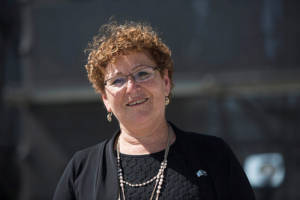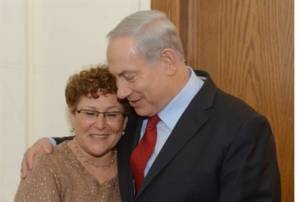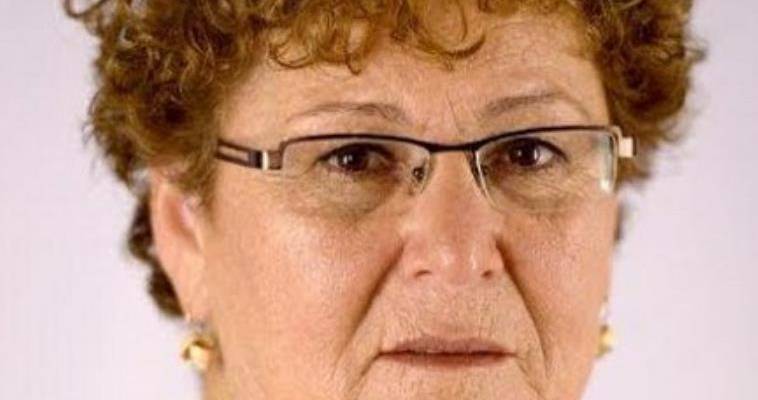Despite the horror of losing two soldier sons, Miriam Peretz says it’s a privilege to fight for the Jewish state. “They can never kill the spirit of this nation.”
By Atara Beck
The title of a book published several years ago, Miriam’s Song, does not refer to the biblical Miriam who led the Israelite women in song following the miraculous splitting of the Red Sea.

Miriam Peretz (Yonatan Sindel/Flash90)
The book tells the story of Miriam Peretz, a heroic Jewish mother and grandmother who, despite losing two precious sons in Israel’s wars and a husband who died of a broken heart, continues to sing.
Uriel, 22, died while serving as commander of the IDF Golani Special Forces Unit fighting Hezbollah in Lebanon in 1998.
Eliraz, 32, father of four children and a major in the Golani brigade fighting terrorists in Gaza, was killed in 2010.
A few days before the annual Yom HaZikaron, Israel’s Memorial Day, which is followed immediately by Yom Ha’Atzmaut, Independence Day, Peretz explained to a group of journalists in Jerusalem exactly how she manages to do that, followed by a public address at the Menachem Begin Heritage Center.
Perhaps what is most remarkable about Peretz is not only her ability to laugh and even to be an activist with a strong purpose, but the fact that she could laugh deeply, from the gut.
In fact, while moving the audience to tears with her heartbreaking story, she also managed – with her profound sense of humor and natural ability to connect with others – to make everyone laugh, as if she were a professional comedian.
She gives hope and strength not only to the bereaved, but also to the Israeli people who constantly choose life and happiness, struggling to overcome fear of losing a loved one in either a war or a terror attack.
It is only her faith in God that allows her to continue, she declared. Each day she makes a conscious choice to embrace life.
Following are excerpts of her talk.
This week my heart is broken… How do we go from Yom HaZikaron to Yom Ha’Atzmaut?
It is very difficult for me on Yom HaZikaron. All my children’s friends come to our home – 500 people. I feel like I’m hosting. They speak not about my children, but about their lives, how they continue…their homes, their children, their jobs. One of mine was married, but didn’t live to see his children grow up.
We finish Yom HaZikaron at 8 [in the evening] and begin Yom Ha’Atzmaut [according to the Jewish lunar calendar, which begins a new day after sunset]. So I shut my windows and doors, and go to my bed to be by myself. I used to celebrate.
In the morning, I go to Mount Herzl, to the graves of my children. The day before, on Yom HaZikaron, it’s for all the people of Israel to go to the cemetery and to remember how much we pay for this country.
So on Yom Ha’atzmaut, I go to their graves. I clean the flowers that people had put there. I stay with them and ask them if they’ll let me be happy today. Then I go and do what the rest of the nation does – barbecue, visit grandchildren and continue my life.
This is not my story only. It’s the story of all of Israel…going from darkness to light, from sorrow to joy.
People all over the country want to know: How do I continue?
I was born with optimism. I dance when I hear music. I’m very happy, but what gives me strength? My faith in God.
Sometimes I love God, sometimes I’m so angry, but I never let Him go away from me.
I ask: Why MY children? Why?

Bereaved mother Miriam Peretz with Prime Minister Benjamin Netanyahu. (File/Amos Ben Gershom/Flash90)
There is no answer to this question. We can’t understand how God runs the world… The moment when I was the most down, I understood that I can only rely on God. No one is protected. Nothing is certain. We are in the hands of God.
I could choose to cry every day about my destiny…but this is not my way. Every day I wake up and look at the miracles of God. There are many, many miracles.
Life is stronger than death. My [other] children are all grown and married. I have grandchildren… It’s a choice. We never go backward, only forward.
They killed the bodies of my children, but they can never kill the spirit of this nation.
The message of this book is that strength comes in a time a time of crisis. It’s a matter of choice.
I wrote this book for my grandchildren. On Passover, we are commanded to tell our children [that in each generation our enemy comes to kill us, but God saves us]… But there is no father for my son’s children, so I, the grandmother, must tell them.
It’s a privilege for a Jew to take care of his land and fight for his country.
‘I’d Rather Die Living Than Live a Dead Life’
Eliraz needed his mother’s signed permission to fight in a combat unit, since she had already lost a son in battle. He told his mother: “If you live without a mission, it’s not a life. I’d rather die living than live a dead life.”
“So I signed. It’s up to God to decide who will live and who will die,” she said.
Born in Morocco, Peretz’s parents were illiterate, living in the Sahara Desert. “They knew only one word in Hebrew – Jerusalem,” she said. They couldn’t have known how much I would pay for Jerusalem.”
Referring to the book’s title, she explained, “It’s very easy to sing when you have a miracle in your life. It’s very easy to love God when your dreams come true. But the test is if you can continue to love God when you lose two children.”
